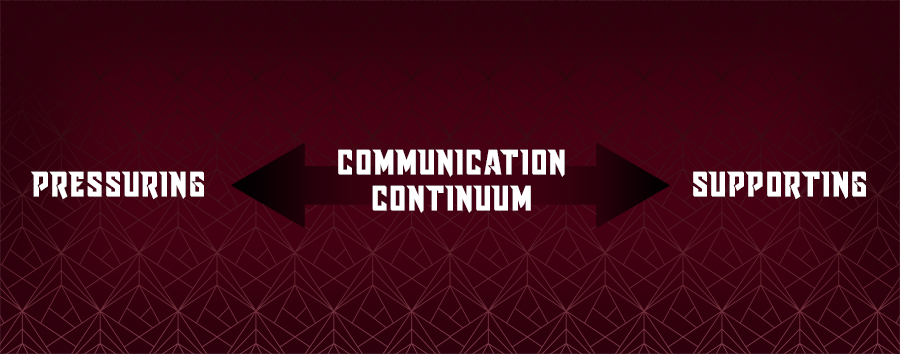← Back to News

The Conscious Sports Parent: Part 1
10.03.2020
Parents as Collaborators in Creating a Supportive Youth Sports Climate
The intention of this series of three articles is very simple.
It is, in short, to make a change in an aspect of sports that is often ignored or labeled as too sensitive. We love to work on the grey area sides of things as there often a lot of hidden progress can be made.
This series is our attempt to go beyond the creation of, again as has been done hundreds of time, more awareness on the state of the sports environment and the influence it has on our children’s development.
Surely it is very easy to say “sports are great for development” and share many popular examples to support that assumption.
We might just as well turn it around and say “sports are horrible for development” and share again many examples that support that assumption.
As we all have witnessed, sports has shown itself in the past as both a testimony of human will-power and creativity as it has exposed human superficiality and channeled our most animal instincts.
The aim will centre here around what we are envisioning when we create the “youth sports environment” and how parents can be our best contributors and collaborators in our shared quest to support the kids.
Before we share more, we wanted our kids to share about this topic*.
We asked them three questions:
1. do you like it when parents come to your games?
2. what behaviors do you like/dislike of parents before and after the game?
3. what general advice would you give to all parents that would support while you and your team mates are playing?
*Our aim of this is not to point fingers at anyone, rather to show how when kids are allowed to speak freely they are a great source of information and feedback. Maybe one day we can do a similar video with the parents and change roles, but for the scope of this text this will do :).
Organizers, coaches, parents and kids together form the living tissue of the basketball community that works in unison towards a healthy, long-term, loving sports climate that supports continuous learning, exploration and self-cultivation.
We will both propose supportive behaviors and dissect certain common parental behaviors that could potentially limit our kids’ still very vulnerable and plastic development.
Further we will look into suggestions regarding communication style, self-regulation techniques, implications of more supportive and rather controlling behaviors in relation to our children’s self-confidence, coping mechanisms and life orientations within sports – and beyond sport environment.
Pressure is not (felt as) support
“I just want to do everything
to help my kid
get ‘there’”.
“I wish all of this was around
when I was young,
then I would have made ‘it’
so I’m happy I can
give my kid ‘this’.”
If we want to engage children in sports from a young age and support them to reach their full potential, then it is definitely essential to offer a nourishing environment during these developmental or ‘plastic’ years – and parents play a very important role in this process. So what constitutes a fertile soil when we are speaking of a healthy, supportive and safe sports climate?
When we look at research on parent-child relationship in sports psychology we observe certain behaviors that could lead to appropriate and inappropriate parent participation. By “appropriate” is meant that it would lead to an increase on the child’s enjoyment and motivation in the sport whereas “inappropriate” would lead to a decrease. One of those aspects is the way in which we communicate with all children.
- Children do want to share their sporting experience with their parents and what they want to feel and hear from them is that they are supportive of the efforts they put it and the attitudes they bring into the activity.
- What kids do not prefer is to feel pressured and controlled towards a certain type of performance or measurable success.
- Kids appreciate practical advice but choose not to receive technical coaching if the parents did not have personal experience or achievements in the sport.
If we would place such expressions on a communication continuum we could observe a range going from rather pressuring communication towards more supportive communication.

As parental pressure increases, children report that enjoyment and satisfaction decreases. Parents may have the best intentions for their child and may believe that expressing disappointment after a ‘poor performance’ will promote more motivation towards improvement but from the perspective of the child it often backfires and may lead to less joy and a-motivation.
Each child is unique so it is important to check the outcome of your communicative assumptions with the actual behavioral reactions of your child and to stay flexible in your approach.
So when do children perceive pressure from their parents?
Directions and controlled behavior are felt as pressuring. An important self-reflective element here seems for the parents to make a distinction between the motivation that the child has in playing the sport and aligning motivation of yourself as a parent with that of the child rather than directing theirs to align with yours.
Projecting your own motivations could negatively influence the child’s perceptions of their own ability, where they should orientate themselves and their attitude in life – in short it could make them believe that their self-approval lies in the gratification of others.
It is easy to fall in this trap if you have not exposed yourself of the motivations you unwittingly hold for your child.
Sports of course offer the alluring perfect playground to re-try personal unfulfilled athletic dreams by projecting them on the unwritten, innocent child
…but this has its consequences and parents’ motivational issues could influence their children’s motivation to change course from from a task orientation (“being present in the game”) towards an ego orientation (feeling loved and valued based on performance and outcome conditions).
Children’s opinions unfortunately sometimes show that their parents manner of being involved in their sport experience was associated with anxiety, decrease in motivation and potential drop-out behavior.
Just to show a potential long-term effect such unresolved motivational issue might have, we recall a sports psychology workshop of an NBA mental coach who mentioned an All-Star level player whose his points per game dropped by an average of 6 points whenever his father attended his games. The coach had the adult player train with a life-size cardboard in the basketball facility to help him become more at ease and prepare him for his father’s presence!
To repeat the initially stated, children do love to share their sports activities with their parents but the nuance is that the shared experience they prefer is found in support and comprehension.
Kids, just like any adult, want to be seen and understood for who they are, for their attitudes, the things they actually can control with their presence, attention and intention. Kids don’t want to feel constantly evaluated for their performance or to feel like a tool for the living out of the parents’ hopes and dreams instead of their own.
Or as the Indian philosopher Jiddu Krishnamurti said: “the highest form of human intelligence is the ability to observe without evaluating.”
It is of the highest possible order of importance for their development – yes, even in sports! – that our children feel, not just know, that our love for them is unconditional and never conditionally based on their sports performance.
We admit, this is a challenge but if we aim we might as well set our aims high.
The second part in this series will be posted on March 24.
Sources
Jay Coakley (2005), The Good Father: Parental Expectations
and Youth Sports
Jay Coakley (2010), The Logic Of Specialisation: Using Children for Adult’s Purposes
Jay Coakley (2011), Youth Sports: What Counts as Positive Development?
Daniel Coyle (2013), The Encyclopedia of Sports Parenting
Daniel Gould and Larry Lauer (2005), Understanding the Role Parents Play in Junior Tennis Success
Camilla J. Knight (2014), Parent Guide: Evidence-based strategies for parenting in organized youth sport
Camilla J. Knight (2015), Influences on Parental Involvement in Youth Sport
Dr. Stephen Porges (2018), How We Influence Our Children’s Nervous System, https://www.youtube.com/watch?v=DNIozAiorZA
Dr. Wilhelm Reich (1984), Children Of The Future
PhD Marshall Rosenberg (2004), Teaching Children Compassionately: How Students and Teachers Can Succeed with Mutual Understanding
Anthony J. Ross, Clifford J. Mallett and Jarred F. Parkes (2015), The Influence of Parent Sport Behaviours on Children’s Development: Youth Coach and Administrator Perspectives
Pedro A. Sánchez-Miguel (2013), The Importance of Parents’ Behavior in their Children’s
Enjoyment and Amotivation in Sports
Jim Taylor (2011), Red Flags of Over-Invested Sports Parents
Michael P. Wasser (1982), Children in Sport: Participation Motives and Stress
Richard Weissbourd (2009), The Morally Mature Sports Parent




